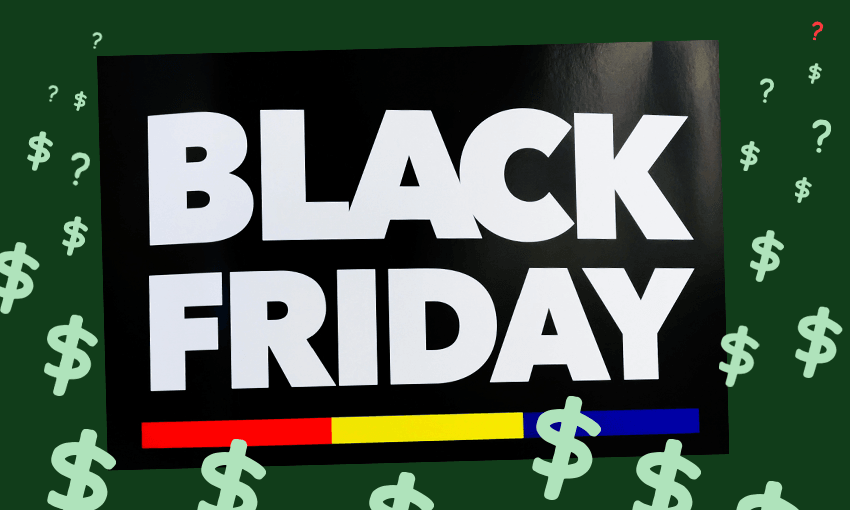Your annual warning to watch out for sales scams ahead of this week’s extreme shopping extravaganza.
It’s supposed to be the sale to end all sales, the all-you-can-eat buffet of good deals, the crème de la crème of discounts. Forget The Warehouse, this coming Friday is expected to be the day when everyone really does get a bargain. Need a new TV? How about a frying pan? Want to get your Christmas shopping done early? How does 70% off sound?
Retailers want you to do all of this and much more this coming Black Friday, the day wallets get prised open for the imported American shopping event celebrating conspicuous consumerism, one that will no doubt end with horrifyingly savage in-store rampage videos – hopefully none from Aotearoa – being posted to social media.
By all accounts, we will shop our socks off – then buy several pairs of new ones to replace them. Half of all New Zealanders are expected to purchase something that’s been discounted on Friday, and on average they’ll spend a whopping $731 each, according to research conducted by the price comparison company PriceSpy.
Last year’s Black Friday pulled in a whopping $248 million, putting it well ahead of Boxing Day, Easter and New Year’s sales. This year’s event follows two Black Fridays conducted under Covid restrictions that pushed the mania online. Retailers have been warned that frenzied shoppers will be returning in droves to check out the bargains first-hand.
But just how good are those deals? Some, says PriceSpy’s country manager Lisa Matinvesi-Bassett, will not be as good as they seem. Some may not be bargains at all. “Through our research … we found some [retailers] to be engaging in fake sales,” she says.
Fake sales? She means items that had prices raised in the lead-up to Black Friday, only to have them dropped on the day. PriceSpy has data to back those claims up, saying one in every 10 items promising a supreme Black Friday deal wasn’t all it promised to be.
This, says Matinvesi-Bassett, is not a good look for retailers – especially when many consumers are dealing with a financial crunch right now. “With shoppers facing a cost of living crisis, misleading promotional claims and fake sales only turn shoppers away at a time when retailers need them most,” she says.
“Right now, in order to earn back the trust of shoppers, retailers need to be transparent and authentic with their pricing and marketing information.”
The watchdogs at Consumer NZ agree, issuing a warning not to take retailers’ word that something is on sale. “Don’t buy something just because the store claims it’s on special,” it says in a list of 10 things to watch out for while shopping on Black Friday. “Compare prices online to make sure another shop isn’t selling the item cheaper.”
Its other recommendations include avoiding all “buy now, pay later” offers, ignoring pressure sales tactics like, “Don’t miss out!” and “Going fast!”, and turning down any offer of an extended warranty. You’re probably already covered under the Consumer Guarantees Act.
Planning, says Matinvesi-Bassett, is the best way to get the most out of Black Friday sales. “The key in finding the best deals is to plan ahead and conduct essential price research,” she says. “Look at price points from different stores and be sure to check a product’s price history.”
There is, of course, another option to avoid the madness: pour yourself a crisp glass of lemonade, grab a decent book and a pillow, put your feet up and avoid Black Friday completely. As all Briscoes customers know, another sale is just a weekend away.



